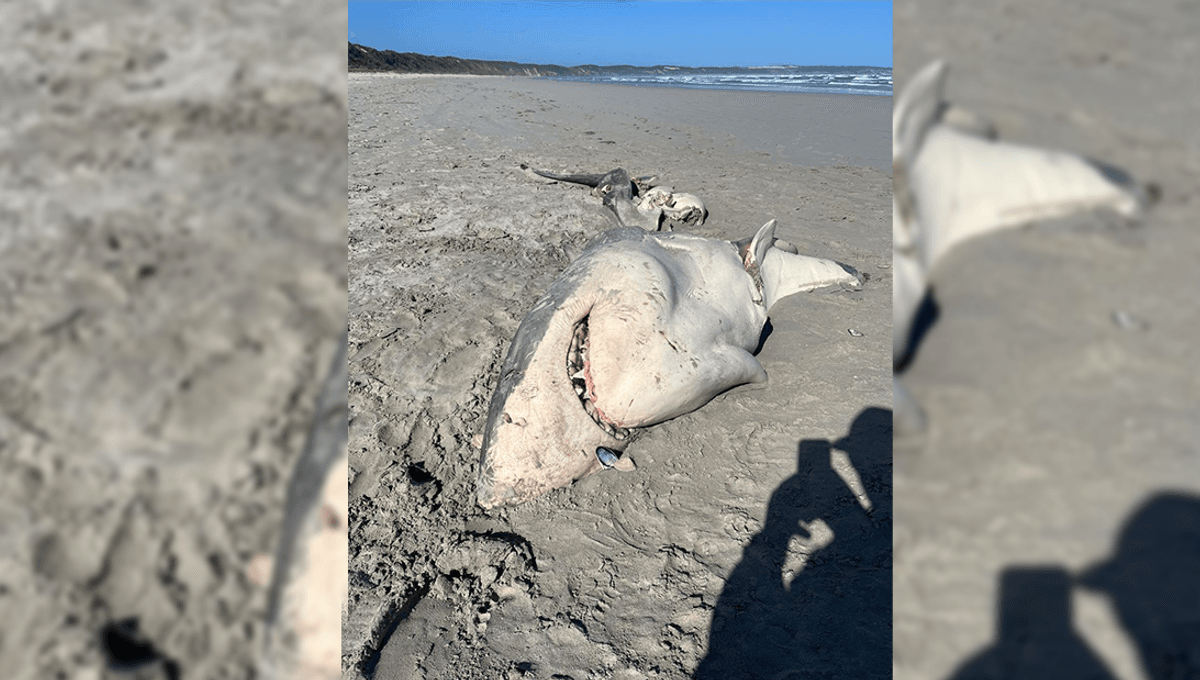
In October, the remains of a dismembered great white shark were discovered on an Australian beach. Scientists have now analyzed them and confirmed that orcas killed the predator, in what is the first confirmed attack of its kind in these waters.
The body, what remained of it at least, washed up on a beach in Portland, Victoria. Residents found the head and spine of a great white shark (Carcharodon carcharias), which led researchers and witnesses to suspect orcas had disemboweled it.
“This is equal parts cool and terrifying”, Ben Johnstone, a local fisher and manager of the bait shop Portland Bait and Tackle wrote in a Facebook post after seeing the remains. “[T]his 3 meter white shark, washed up on the beach at Bridgewater, after being attacked by killer whales.”
Soon after it was discovered, the body was collected and samples were sent to government agencies and academics for analysis. Like a scene from some aquatic version of CSI, the shark’s remains were “loaded” with its killer’s DNA.
The necropsy has now shown that orcas (Orcinus orca) were indeed responsible.
“[Upon] Inspection of the shark, there were really characteristic bite marks right in the pectoral girdle, so right between those fins under the belly, that are quite typical of killer whales where they effectively suck out the liver,” Adam Miller, an associate professor in aquatic ecology and biodiversity at Deakin University, told ABC Radio Melbourne.
To date, this behavior has been seen in South Africa, where pods of orcas have been terrorizing shark populations for several years. According to the analysis Miller led, the 4.9-meter (16-foot) shark found in Portland is the first confirmed evidence that orcas are hunting these animals in Australia too.
Prior to this, orcas had been known to attack blue sharks (Prionace glauca) and shortfin mako sharks (Isurus oxyrinchus) in Australia, but experts had only suspected that the same slurpy fate had befallen some great whites. Apparently, there had already been some aggressive interactions between species off Kangaroo Island and the Neptune Islands in South Australia. But nothing had been confirmed.
Working in partnership with a First Nations group and government authorities, Miller and his colleagues swabbed the bite marks on the shark carcass. “We were able to confirm that those bite wounds were just loaded with killer whale DNA, so it’s a bit of a smoking gun,” he said.
It is not currently clear which pod is responsible for the attack, and nor is the extent of these predations. However, South Africa’s experience suggests potentially worrying implications.
“There has been an increase in predation on white sharks in South Africa,” Miller added. “It’s led to quite a significant decline in the numbers and a displacement of white sharks individually due to shifts in their behavior.”
This has had a cascading effect on the marine ecosystem and for conservation. “When you remove a top predator, this can have a measurable impact on the structure of marine ecosystems.”
“From a conservation point of view it’s significant, but we don’t know how frequently it’s happening so we’ll keep an eye on things,” Miller added.
Source Link: Dismembered Great White Shark Latest Victim Of Orca Attack, But This Time It Was In Australia